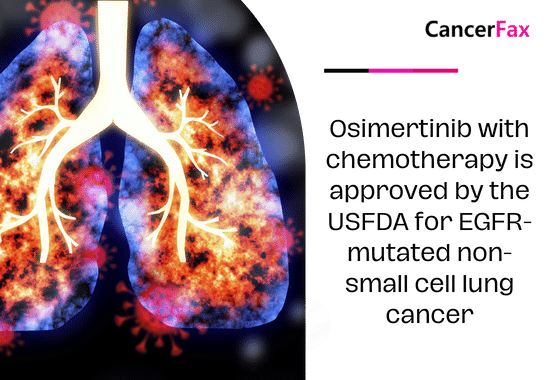Osimertinib with chemotherapy is approved by the USFDA for EGFR-mutated non-small cell lung cancer
The Food and Drug Administration approved osimertinib (Tagrisso, AstraZeneca Pharmaceuticals LP) in combination with platinum-based chemotherapy for patients with locally advanced or metastatic non-small cell lung cancer (la/mNSCLC) who have tumors with EGFR exon 19 deletions or exon 21 L858R mutations, as identified by an FDA-approved test, on February 16, 2024.
The test was done in FLAURA 2 (NCT04035486), a random, open-label study with 557 people who had either EGFR exon 19 deletion or exon 21 L858R mutation-positive locally advanced or metastatic non-small cell lung cancer (NSCLC) and had not had any systemic treatment for advanced illness before. Patients were randomly assigned in a 1:1 ratio to receive either osimertinib plus platinum-based chemotherapy or osimertinib alone.
The primary efficacy measure was progression-free survival (PFS), evaluated by the investigator, with overall survival (OS) as a significant secondary measure. When osimertinib was combined with platinum-based chemotherapy, progression-free survival (PFS) was much higher than when osimertinib was used alone. The hazard ratio was 0.62 (95% CI: 0.49–0.79; two-sided p-value<0.0001). The median progression-free survival (PFS) was 25.5 months with a 95% confidence interval (CI) of 24.7 to not estimable (NE) in one arm, and 16.7 months with a 95% CI of 14.1 to 21.3 in the other arm.
Although the overall survival statistics were not fully developed at the current analysis, with just 45% of the pre-specified fatalities reported for the final analysis, there was no indication of a negative trend.
Leukopenia, thrombocytopenia, neutropenia, lymphopenia, rash, diarrhea, stomatitis, nail damage, dry skin, and high blood creatinine levels were some of the most common side effects that happened to people who were given osimertinib along with platinum-based chemotherapy.
The suggested osimertinib dosage is 80 mg taken orally once a day, with or without food, until disease progression or unacceptable toxicity. Consult the prescribing information for pemetrexed with cisplatin or carboplatin for the specific dose details.
Dr. Nishant Mittal is a highly accomplished researcher with over 13 years of experience in the fields of cardiovascular biology and cancer research. His career is marked by significant contributions to stem cell biology, developmental biology, and innovative research techniques.
Research Highlights
Dr. Mittal's research has focused on several key areas:
1) Cardiovascular Development and Regeneration: He studied coronary vessel development and regeneration using zebrafish models1.
2) Cancer Biology: At Dartmouth College, he developed zebrafish models for studying tumor heterogeneity and clonal evolution in pancreatic cancer.
3) Developmental Biology: His doctoral work at Keio University involved identifying and characterizing medaka fish mutants with cardiovascular defects.
4) Stem Cell Research: He investigated the effects of folic acid on mouse embryonic stem cells and worked on cryopreservation techniques for hematopoietic stem cells.
Publications and Presentations
Dr. Mittal has authored several peer-reviewed publications in reputable journals such as Scientific Reports, Cardiovascular Research, and Disease Models & Mechanisms1. He has also presented his research at numerous international conferences, including the Stanford-Weill Cornell Cardiovascular Research Symposium and the Weinstein Cardiovascular Development Conference.
In summary, Dr. Nishant Mittal is a dedicated and accomplished researcher with a strong track record in cardiovascular and cancer biology, demonstrating expertise in various model systems and a commitment to advancing scientific knowledge through innovative research approaches.
- Comments Closed
- March 5th, 2024






Advanced lung cancer options, EGFR inhibitor breakthrough, EGFR-mutant NSCLC treatment, FDA-approved NSCLC drugs 2024, First-line lung cancer regimen, Osimertinib chemotherapy approval, Tagrisso combination therapy, TKI-chemo combination
CancerFax is the most trusted online platform dedicated to connecting individuals facing advanced-stage cancer with groundbreaking cell therapies.
Send your medical reports and get a free analysis.
🌟 Join us in the fight against cancer! 🌟
Привет,
CancerFax — это самая надежная онлайн-платформа, призванная предоставить людям, столкнувшимся с раком на поздних стадиях, доступ к революционным клеточным методам лечения.
Отправьте свои медицинские заключения и получите бесплатный анализ.
🌟 Присоединяйтесь к нам в борьбе с раком! 🌟